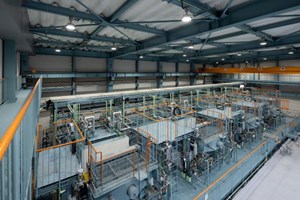News
Asahi Kasei starts operation of multi-module hydrogen pilot plant in Kawasaki
The Japanese technology company Asahi Kasei is further accelerating its H2 business activities. On May 13, company representatives and partners including the Japanese government celebrated the official opening of a new H2 pilot plant in Kawasaki, Japan. Operation start of this commercial-scale facility was in March 2024. The trial operation of four 0.8 MW modules is another milestone towards the realization of a commercial multi-module 100 MW-class alkaline water electrolysis system for green H2 production.
The H2 market is going to expand rapidly in the coming years. According to the Hydrogen Council, cumulative global installed capacity of water electrolyzers forecasted to reach approximately 300 GW by 2030. To meet this increasing demand, Asahi Kasei is developing the Aqualyzer™ alkaline water electrolyzer optimized for the production of green H2. In order to test this new system under realistic conditions in a multi-module setup, the company started constructing a pilot plant at its manufacturing site in Kawasaki in November 2022. The new facility started operation in March 2024, and on May 13, company representatives and partners gathered in Kawasaki to celebrate its official opening.
Masami Takenaka, Lead Executive Officer at Asahi Kasei and responsible for the company’s H2 business, said, “This pilot facility is milestone not only for Asahi Kasei, but also for the global H2 business in general. We believe that successfully operating our equipment in this test facility will be a door opener for commercial large-scale multi-module alkaline water electrolyzers and eventually the realization of a H2 society.”
For the production of green H2, electrolysis systems need to respond to fluctuating power supply from renewable energy sources such as wind or solar. In the pilot plant, four 0.8 MW Aqualyzer modules are being operated under realistic conditions, including operation during maintenance and low power supply during nighttime. In addition, the equipment is designed to simulate fluctuating power input from solar or wind power. By utilizing the data obtained from these trials, Asahi Kasei will further optimize the equipment design, operation methods, and control technology of the electrolysis system. With its multi-module approach, Asahi Kasei aims to combine up to ten modules with a capacity of 10 MW each, enabling commercial large-scale electrolysis systems with a capacity of up to 100 MW.
Start of commercialization in 2025. Asahi Kasei’s H2 business is based on more than four decades of large-scale and long-term experience in the field of chlor-alkali electrolysis. Aiming for a total sales volume of €600 MM by 2030, the company plans to start commercial business activities for its alkaline water electrolyzers in 2025. The pilot plant in Kawasaki is an important step toward achieving this goal, after the successful long-term tests of its 10 MW single-stack alkaline-water electrolysis system at the Fukushima Energy Research Field (FH2R) in Namie, Fukushima, Japan, since 2020. The practical experience gained in Namie and the trial operation at the pilot plant in Kawasaki will further underpin Asahi Kasei’s market entry with large-scale and highly reliable multi-module alkaline water electrolysis equipment. This experience will also be leveraged for the joint feasibility study with Gentari and JGC for a 60 MW-class electrolyzer in Malaysia (GI-Phase 2) targeted for 2027, as announced in November 2023.


